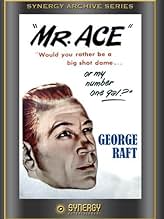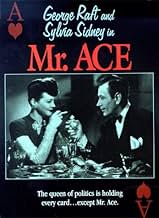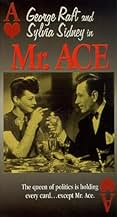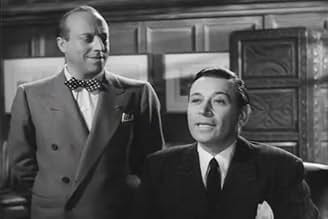AVALIAÇÃO DA IMDb
6,0/10
244
SUA AVALIAÇÃO
Adicionar um enredo no seu idiomaA rich society woman uses a gangster to win a congressional election.A rich society woman uses a gangster to win a congressional election.A rich society woman uses a gangster to win a congressional election.
Joyce Bryant
- Nightclub Singer
- (as Joyce Bryant and the Flennoy Trio)
Stanley Andrews
- Tomahawk Club Boss
- (não creditado)
Walter Baldwin
- Bookie - Party Guest
- (não creditado)
Brooks Benedict
- Man Entering Elevator
- (não creditado)
Truman Bradley
- Radio Forum Moderator
- (não creditado)
Gordon B. Clarke
- Nightclub Pianist
- (não creditado)
James Conaty
- Party Guest
- (não creditado)
Lester Dorr
- Reporter at Party
- (não creditado)
Ben Erway
- Tomahawk Club Politico
- (não creditado)
Mary Field
- Lady with Question on Radio Forum
- (não creditado)
Avaliações em destaque
Margaret Wyndom Chase (Sylvia Sidney) is a hard-driven Congresswoman who is bent on becoming her state's next governor. She is a tough dame and seems willing to jump into the pig sty that is politics to get elected. However, one of the movers and shakers in the state, Eddie Ace (George Raft) has decided not only not to help her but work against her because of his brilliant and modern thinking that 'a pretty woman has no place in politics'!! But after he does what he can to sink her candidacy, Eddie inexplicably helps her with a second chance...presumably because he's suddenly developed a conscience! Considering that he's supposed to be a hard-bitten and rather amoral man, this is utterly preposterous...severely undermining the film.
George Raft is relatively wooden (as usual) and Sidney and the rest are reasonably good. But the huge plot problem I mentioned above does a lot to hurt the film. I honestly think the film could have worked very well if they'd removed the leading character (Eddie Ace) from the film!! The notion of a woman fighting for respect and acceptance in politics in the 1940s would have been really interesting.
George Raft is relatively wooden (as usual) and Sidney and the rest are reasonably good. But the huge plot problem I mentioned above does a lot to hurt the film. I honestly think the film could have worked very well if they'd removed the leading character (Eddie Ace) from the film!! The notion of a woman fighting for respect and acceptance in politics in the 1940s would have been really interesting.
For all its professionalism and excellent music, this is not a very significant film. I actually fell asleep several times during the long gaps of any intrigue leading forward. It becomes interesting not until towards the end, but there is one very interesting character, who actually sustains the whole film: Roman Bohnen as the professor. He raises your interest the moment he first appears, and you look forward to his return throughout the film, which fortunately frequently is repeated. He is the only clever one, while the others are not very convincing. George Raft is always himself as a gangster, and it's impossible to ever like him - his name is enough to deter you from any film he is in. But Sylvia Sidney is even worse - she is probably the least possible convincing actress for a politician.
The twists towards the end save the intrigue and the script, which isn't bad, but the one thing lacking is credibility. They say that all is fair in politicis, but the end proves this wasn't politics at all but merely the old worn-out story of bitter opponents ending up as lovers.
The twists towards the end save the intrigue and the script, which isn't bad, but the one thing lacking is credibility. They say that all is fair in politicis, but the end proves this wasn't politics at all but merely the old worn-out story of bitter opponents ending up as lovers.
10ROCKY-19
This is an undervalued little political drama from an era when politics on the big screen suddenly became popular. While so many such films are based on saccharine preaching or play cute with the "women in politics" theme, there's not an ounce of sugar here.
Ambitious socialite congresswoman Margaret Chase (Sylvia Sidney) seeks the governor's office, and knows exactly how to use the crooked political system (and even her estranged husband) to get there. One thing she needs is the endorsement of the nefarious Tomahawk Club and its top dog, Mr. Ace (George Raft). Like any seasoned politician with more aspirations than ethics, she has no qualms with buddying up to the shady characters. Ace toys with her but is not one to be manipulated. Watch him watch her as he introduces her to his "friends" as if waiting for her to exhibit the same hypocritical benevolence of any male politician trying to curry favor - and she does. The passionate moral compass of the story is her former professor, Joshua Adams, who (for reasons that differ from Ace's) does not want her to be governor. There is a portrait of modern politics as Margaret believes she and Adams are manipulating Ace when in fact Ace and Adams are conspiring against her.
The script by Fred Finklehoff shows great restraint. We get only as much backstory as we absolutely need. The people are human; nobody is an innocent angel and no political bad guy is cackling into his cloak. As in real politics, everyone is trying to manipulate everyone else. Even in "romancing" each other, Margaret Chase and Eddie Ace are actually testing each other's political wills. No hearts and flowers here. This is a romance of black coffee and hard-boiled eggs.
And how refreshing to see actors of a "certain age" actually acting their ages. Sidney is a mature, dynamic woman, and gets to play one. Being attracted to Mr. Ace does not turn Margaret into a brainless flit, nor does Ace let the attraction drown his cynicism. She's more than willing to use backhanded tactics to get around him politically, and he responds by turning the system against her. Only then does she have a change of heart about the entire campaign. And only her obvious change of heart allows Ace to rethink his own motives.
Take note of Roman Bohnen as Prof. Adams. Amid all the professional politicians and their cold-blooded calculations he is the emotional voice of infuriated idealism. This same year ('46) Bohnen also appeared in the brilliant "The Best Years of Our Lives" as a completely different sort of character (Dana Andrews' soft-spoken, alcoholic father). He's simply remarkable.
"Mr. Ace" was the third of a trilogy of films Raft and Sidney did together. "Pick-Up" brought them together in the early '30s, "You and Me" in the late '30s, and then "Mr. Ace." Their natural chemistry ages like fine wine.
Ambitious socialite congresswoman Margaret Chase (Sylvia Sidney) seeks the governor's office, and knows exactly how to use the crooked political system (and even her estranged husband) to get there. One thing she needs is the endorsement of the nefarious Tomahawk Club and its top dog, Mr. Ace (George Raft). Like any seasoned politician with more aspirations than ethics, she has no qualms with buddying up to the shady characters. Ace toys with her but is not one to be manipulated. Watch him watch her as he introduces her to his "friends" as if waiting for her to exhibit the same hypocritical benevolence of any male politician trying to curry favor - and she does. The passionate moral compass of the story is her former professor, Joshua Adams, who (for reasons that differ from Ace's) does not want her to be governor. There is a portrait of modern politics as Margaret believes she and Adams are manipulating Ace when in fact Ace and Adams are conspiring against her.
The script by Fred Finklehoff shows great restraint. We get only as much backstory as we absolutely need. The people are human; nobody is an innocent angel and no political bad guy is cackling into his cloak. As in real politics, everyone is trying to manipulate everyone else. Even in "romancing" each other, Margaret Chase and Eddie Ace are actually testing each other's political wills. No hearts and flowers here. This is a romance of black coffee and hard-boiled eggs.
And how refreshing to see actors of a "certain age" actually acting their ages. Sidney is a mature, dynamic woman, and gets to play one. Being attracted to Mr. Ace does not turn Margaret into a brainless flit, nor does Ace let the attraction drown his cynicism. She's more than willing to use backhanded tactics to get around him politically, and he responds by turning the system against her. Only then does she have a change of heart about the entire campaign. And only her obvious change of heart allows Ace to rethink his own motives.
Take note of Roman Bohnen as Prof. Adams. Amid all the professional politicians and their cold-blooded calculations he is the emotional voice of infuriated idealism. This same year ('46) Bohnen also appeared in the brilliant "The Best Years of Our Lives" as a completely different sort of character (Dana Andrews' soft-spoken, alcoholic father). He's simply remarkable.
"Mr. Ace" was the third of a trilogy of films Raft and Sidney did together. "Pick-Up" brought them together in the early '30s, "You and Me" in the late '30s, and then "Mr. Ace." Their natural chemistry ages like fine wine.
Congresswoman Sylvia Sidney announces her candidacy for governor, and asks political boss George Raft for his support. He wines her and dimes her and tells her she cannot win, because beautiful women shouldn't be in politics. So she goes to another member of his machine and cuts a deal with him for the nomination in the one-party state.
Miss Sidney's character, named Margaret Wyndham Chase, is clearly modeled on Maine senator Margaret Chase Smith. She even wears the hideous hats that Mrs. Smith affected. The political machine, named the Tomahawk Club, is modeled on New York City's Tammany Hall.
One of the issues I have with Mr.Raft's performances in movies is his impenetrable mien. He says things, and they are things that he believes, it there is rarely any hint of what he is actually thinking. Here that actually works to the performance's benefit; he seems a character who is precise, intelligent and impenetrable. This leaves Miss Sidney to carry the emotional weight of this political romantic comedy.
This was a period during which Hollywood was making movies about practical politics and the effects of the machine. With the end of the Second World War, soldiers were coming home and expected changes. Capra tried a couple of movies, and even John Ford got together his non-western stock company for THE LAST HURRAH. By the time that came out, there were stirrings of change in society and politics, and the movies were no longer part of the National conversation. Nowadays, political movies usually have a sour, satirical edge to them.
Miss Sidney's character, named Margaret Wyndham Chase, is clearly modeled on Maine senator Margaret Chase Smith. She even wears the hideous hats that Mrs. Smith affected. The political machine, named the Tomahawk Club, is modeled on New York City's Tammany Hall.
One of the issues I have with Mr.Raft's performances in movies is his impenetrable mien. He says things, and they are things that he believes, it there is rarely any hint of what he is actually thinking. Here that actually works to the performance's benefit; he seems a character who is precise, intelligent and impenetrable. This leaves Miss Sidney to carry the emotional weight of this political romantic comedy.
This was a period during which Hollywood was making movies about practical politics and the effects of the machine. With the end of the Second World War, soldiers were coming home and expected changes. Capra tried a couple of movies, and even John Ford got together his non-western stock company for THE LAST HURRAH. By the time that came out, there were stirrings of change in society and politics, and the movies were no longer part of the National conversation. Nowadays, political movies usually have a sour, satirical edge to them.
This film's makers probably were aiming at a kind of political satire that Capra and Sturges sometimes brought off, but a lack of focus and fear of breaching the production code resulted in a script that lurches one way and then another.
Sylvia Sidney is excellent as a female politician, back when such things were rare, doing her best to conceal her ambition and ruthlessness behind an attractive demeanor with a fixed smile. The script doesn't quite know what to make of her. At first she seems not only wholly self-centered but frigid, having driven her husband, whom she married for his wealth and position, into the arms of other women without her much caring about it. Later she becomes more sympathetic for not being corrupt like most of the other pols around her, and for having to walk a fine line between being ladylike and being "one of the boys."
George Raft is his usual stoic self as a hard-bitten political with hinted-at mob connections whose only ideology is winning and graft (or G. Raft).
Sidney's idea is to lure him away from the machine candidate to back her. In one scene she inveigles him into spending the night at her place with apparent intentions of seducing him, but then the movie gets cold feet and the scene fizzles out, as do many others.
Still the film addresses, albeit timidly, political corruption and the ease with which the masses can be manipulated, and also reminds us of the pervasive sexism of that era. Sidney is repeatedly told "you're too attractive to run for office." Was ugliness considered a necessary attribute of female politicians in those days?
As you'd expect, some romantic sparks eventually fly between the two co-stars en route to its wildly implausible ending.
Good cinematography and some lavish interior decoration. If you're the type who enjoys watching old films for a window into the political atmosphere of their times, this is for you.
Sylvia Sidney is excellent as a female politician, back when such things were rare, doing her best to conceal her ambition and ruthlessness behind an attractive demeanor with a fixed smile. The script doesn't quite know what to make of her. At first she seems not only wholly self-centered but frigid, having driven her husband, whom she married for his wealth and position, into the arms of other women without her much caring about it. Later she becomes more sympathetic for not being corrupt like most of the other pols around her, and for having to walk a fine line between being ladylike and being "one of the boys."
George Raft is his usual stoic self as a hard-bitten political with hinted-at mob connections whose only ideology is winning and graft (or G. Raft).
Sidney's idea is to lure him away from the machine candidate to back her. In one scene she inveigles him into spending the night at her place with apparent intentions of seducing him, but then the movie gets cold feet and the scene fizzles out, as do many others.
Still the film addresses, albeit timidly, political corruption and the ease with which the masses can be manipulated, and also reminds us of the pervasive sexism of that era. Sidney is repeatedly told "you're too attractive to run for office." Was ugliness considered a necessary attribute of female politicians in those days?
As you'd expect, some romantic sparks eventually fly between the two co-stars en route to its wildly implausible ending.
Good cinematography and some lavish interior decoration. If you're the type who enjoys watching old films for a window into the political atmosphere of their times, this is for you.
Você sabia?
- Curiosidades"The Hedda Hopper Show - This Is Hollywood" broadcast a 30 minute radio adaptation of the movie on January 25, 1947 with George Raft and Sylvia Sidney reprising their film roles.
- Citações
Margaret Wyndham Chase: You'll make a very impressive governor's husband, darling.
Principais escolhas
Faça login para avaliar e ver a lista de recomendações personalizadas
Detalhes
- Tempo de duração
- 1 h 24 min(84 min)
- Cor
- Proporção
- 1.37 : 1
Contribua para esta página
Sugerir uma alteração ou adicionar conteúdo ausente






































